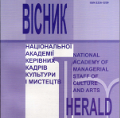ЕВОЛЮЦІЯ ПОНЯТТЯ «ТРАВМАТИЧНИЙ ДОСВІД»: КУЛЬТУРОЛОГІЧНИЙ АСПЕКТ
EVOLUTION OF THE CONCEPT OF TRAUMATIC EXPERIENCE: CULTURAL ASPECT
Author(s): Olha KopiievskaSubject(s): Social history, Health and medicine and law, Sociology of Culture
Published by: Національна академія керівних кадрів культури і мистецтв
Keywords: trauma; trauma of social change; traumatic experience; trauma of modernisation; therapeutic practice;
Summary/Abstract: The purpose of the article is to conduct a cultural reflection to clarify the peculiarities of the evolution of the concept of traumatic experience, to outline the specifics of its conceptual and semantic deployment in the European socio-cultural space. The research methodology includes general scientific principles of systematisation and generalisation of the problem under study, which allowed to identify and scientifically substantiate existing theories, conceptual approaches to understanding the content of the concepts of ‘trauma’, ‘traumatic experience’, ‘trauma of modernisation’, ‘trauma of social change’. The purpose and objectives of the article led to the use of an axiological approach, which allowed identifying the interdisciplinary nature of the theories under consideration, revealing personalised scientific positions and their cultural context. The use of the analytical method allowed us to identify conceptual foundations for further scientific perspectives on the problematisation of traumatic experience, namely, to clarify the role and significance of cultural/creative practices in processing traumatic experience by studying the evolution of this concept within the framework of the formation of trauma studies as an independent field of scientific knowledge and to make an attempt to develop algorithms for their practical implementation in the discourse of applied cultural studies. The scientific novelty lies in the cultural analysis of personalised scientific positions on the evolution of the concept of ‘traumatic experience’, in view of the specifics of its conceptual and semantic deployment in the European socio-cultural space. Conclusions. The conceptual and semantic development of the concept of traumatic experience unfolds against the dynamic change in the European general socio-cultural context caused by the outbreak and course of the First World War. Already during the war and after its end, on the basis of the empirical experience gained in the treatment of numerous traumas and mental disorders, scientific understanding of their nature, the specifics of traumatic experience manifestations began, and practicing military doctors, psychiatrists and psychologists developed recommendations for its experience, overcoming, and processing/working through. The evolution of the concept of traumatic experience in the discourse of classical psychoanalysis developed in the unity of epistemological and hermeneutical theory of experience, playing a leading role in explicating trauma and traumatic experience in the sphere of interest of various social sciences and humanities, from art history and cultural studies to sociology and political science. By expanding the subject field of studying trauma and traumatic experience, Freud laid the foundation for a methodological principle that is called interdisciplinary and becomes one of the basic ones for further studying trauma and traumatic experience against the broad background of a holistic picture of human existence in society and the world of culture.
Journal: Вісник Національної академії керівних кадрів культури і мистецтв
- Issue Year: 2024
- Issue No: 3
- Page Range: 3-13
- Page Count: 11
- Language: Ukrainian

